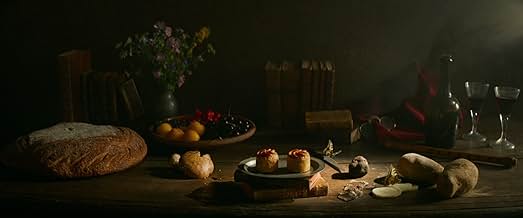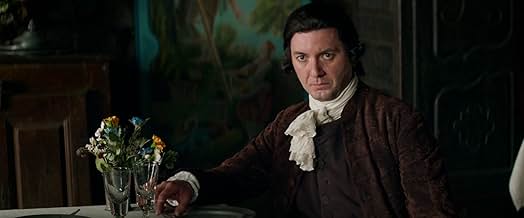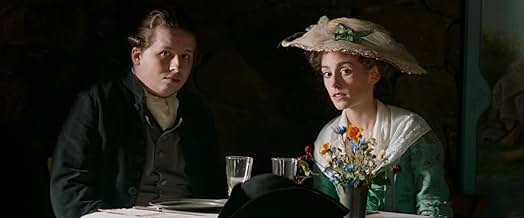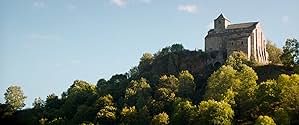CALIFICACIÓN DE IMDb
7.0/10
6.7 k
TU CALIFICACIÓN
Francia, 1789, poco antes de la Revolución. Con la ayuda de una joven sorprendente, un chef que ha sido despedido por su amo encuentra la fuerza para liberarse de su puesto de sirviente y ab... Leer todoFrancia, 1789, poco antes de la Revolución. Con la ayuda de una joven sorprendente, un chef que ha sido despedido por su amo encuentra la fuerza para liberarse de su puesto de sirviente y abre el primer restaurante.Francia, 1789, poco antes de la Revolución. Con la ayuda de una joven sorprendente, un chef que ha sido despedido por su amo encuentra la fuerza para liberarse de su puesto de sirviente y abre el primer restaurante.
- Dirección
- Guionistas
- Elenco
- Premios
- 3 nominaciones en total
- Dirección
- Guionistas
- Todo el elenco y el equipo
- Producción, taquilla y más en IMDbPro
Opiniones destacadas
A very nice and pleasant story that puts food and the love of cooking in marvelous light. Good acting, good visuals and some funny moments.
It's set in 1789 France just before the Revolution in a rural fictional dukedom of Chamfort. It tells the story of the invention of the modern restaurant concept in a time when only the nobility ate well.
Pierre Manceron (Grégory Gadebois) is the master chef for Le duc de Chamfort (Benjamin Lavernhe). Chamfort loves Manceron's cooking, but insists that he stick to set menus and not be creative in his recipes. When Manceron creates a little appetizer he calls "Délicieux" that contains potato, Manceron is dismissed after refusing to apologize for serving such a dish.
He returns to his rural home with his son, Benjamin (Lorenzo Lefèbvre), and together with an elderly mentor, Jacob (Christian Bouilette) runs a relay (postal) station that also serves basic food. Suddenly, a mysterious woman appears and asks to be Manceron's cooking apprentice. Louise (Isabelle Carré) claims to a former jam maker, but Manceron believes she actually must have been a prostitute. He refuses to accept her for a time, but ultimately agrees to train her.
They create dishes based on local produce and local livestock, and begin to attract a significant clientele. The duke is intrigued, misses his cook who he has not been able satisfactorily to replace, and offers to stop by for a traditional feast. If successful he'll invite Manceron back into service.
The film then takes a sharp departure into the pre-Revolution politics of the day, we learn the truth of Louise's background, and the story unfolds in unexpected ways.
This is beautifully-filmed movie. The scenes of food preparation reminded me of "Babette's Feast." The unfolding interaction between Manceron, Benjamin (who is pro-class struggle), and Louise is well done. The sharp departure two-thirds of the way into the movie started to to make it go off the rails for me. I expect minimal plausibility in historical films; this one drifted too far in its link to the French Revolution and ended somewhat unsatisfactorily.
Still, the cinematography and the initial storyline made it a good watch.
Pierre Manceron (Grégory Gadebois) is the master chef for Le duc de Chamfort (Benjamin Lavernhe). Chamfort loves Manceron's cooking, but insists that he stick to set menus and not be creative in his recipes. When Manceron creates a little appetizer he calls "Délicieux" that contains potato, Manceron is dismissed after refusing to apologize for serving such a dish.
He returns to his rural home with his son, Benjamin (Lorenzo Lefèbvre), and together with an elderly mentor, Jacob (Christian Bouilette) runs a relay (postal) station that also serves basic food. Suddenly, a mysterious woman appears and asks to be Manceron's cooking apprentice. Louise (Isabelle Carré) claims to a former jam maker, but Manceron believes she actually must have been a prostitute. He refuses to accept her for a time, but ultimately agrees to train her.
They create dishes based on local produce and local livestock, and begin to attract a significant clientele. The duke is intrigued, misses his cook who he has not been able satisfactorily to replace, and offers to stop by for a traditional feast. If successful he'll invite Manceron back into service.
The film then takes a sharp departure into the pre-Revolution politics of the day, we learn the truth of Louise's background, and the story unfolds in unexpected ways.
This is beautifully-filmed movie. The scenes of food preparation reminded me of "Babette's Feast." The unfolding interaction between Manceron, Benjamin (who is pro-class struggle), and Louise is well done. The sharp departure two-thirds of the way into the movie started to to make it go off the rails for me. I expect minimal plausibility in historical films; this one drifted too far in its link to the French Revolution and ended somewhat unsatisfactorily.
Still, the cinematography and the initial storyline made it a good watch.
This movie was a genuine pleasure to watch... in my book it ranks way up there with a few other movies that use food and cooking as the centerpiece around which the plot was built. Chef, The Hundred Foot Journey, The Big Night, Tortilla Soup, Babette's Feast, Burnt, Chocolat and Dinner Rush are the main ones that come to mind.
Delicious, and these others, stand out as exemplary stories... beautifully photographed, directed and acted.
The natural lighting used for interior scenes sets a very high standard for fellow cinematographers... The food looked so good I wanted to try "The Delicious" myself.
The directing was right up there with the work of Lasse Hallstrom.
And I will watch all day long the subtle acting of this fine ensemble cast... preferring it to the "obnoxious excess of personality" many actors bring to a role.
To sum it up............... incroyable !!!
Delicious, and these others, stand out as exemplary stories... beautifully photographed, directed and acted.
The natural lighting used for interior scenes sets a very high standard for fellow cinematographers... The food looked so good I wanted to try "The Delicious" myself.
The directing was right up there with the work of Lasse Hallstrom.
And I will watch all day long the subtle acting of this fine ensemble cast... preferring it to the "obnoxious excess of personality" many actors bring to a role.
To sum it up............... incroyable !!!
I went in expecting a somewhat schmaltzy, feel-good movie and that's what I got. But it was a beautifully done and sets itself apart from many other movies that follow the same formula with beautiful direction an underlying message of being true to a passion. It was exactly what I needed after a string of downers.
There are some tropes and cliches, any seasoned moviegoer will be able to predict the plot as it unfolds. I was unfamiliar with the cast; everybody played their parts well, but nobody particularly stood out to me. The production design was outstanding, it was a simple movie about simple people so less was more. Sometimes a simple, direct approach is the best route.
There are some tropes and cliches, any seasoned moviegoer will be able to predict the plot as it unfolds. I was unfamiliar with the cast; everybody played their parts well, but nobody particularly stood out to me. The production design was outstanding, it was a simple movie about simple people so less was more. Sometimes a simple, direct approach is the best route.
After chef Manceron is sacked by his fussy aristocratic boss, a woman appears out of nowhere and asks him to let her be an apprentice chef. He is unwilling as he thinks that chefs should all be males. She hands him some money for her tuition fees and finally pursuades him to teach her. He teaches her how to identify plants suitable for eating, and how to cook animals. She becomes an excellent cook, and we see some of the delicious looking food that she produces. We learn about the poverty of the local peasants and how many are starving. The arrogance and condescending attitude of the Duc de Chamfort and his fellow aristocrats give us a taste of the unfair treatment given to the poorer people which eventually led to the French Revolution.
¿Sabías que…?
- TriviaVery loosely based on true events as the first restaurants in France around 1789 emerged in Paris, not the countryside. Furthermore, the movie is not historically correct either by claiming that the first restaurant was created in France. The modern concept of a restaurant was already happening 600 years before in China circa 1100.
- Créditos curiososAt the end of the credits, there is a short clip of a table, with two 'Delicious' set amidst items of food, flowers, wine, etc, while some butterflies flutter about.
Selecciones populares
Inicia sesión para calificar y agrega a la lista de videos para obtener recomendaciones personalizadas
- How long is Delicious?Con tecnología de Alexa
Detalles
Taquilla
- Presupuesto
- EUR 5,000,000 (estimado)
- Total a nivel mundial
- USD 8,371,523
- Tiempo de ejecución1 hora 52 minutos
- Color
- Relación de aspecto
- 2.39 : 1
Contribuir a esta página
Sugiere una edición o agrega el contenido que falta






























